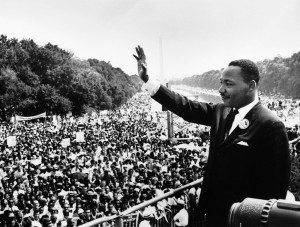
“If physical death is the price that I must pay to free my white brothers and sisters from a permanent death of the spirit, then nothing can be more redemptive.” – Martin Luther King Jr.
Today we commemorate Martin Luther King Jr. – the inspirational leader, moral arbiter and emblematic martyr of the U.S. civil rights movement. A prophet who led America out of its Jim Crow darkness, for thirteen turbulent years, this devout Baptist preacher harnessed the energy of the African-American masses and presented their grievances to the white-controlled governments. From the triumphs of the 1955 Montgomery bus boycott through to the March on Washington with its stirring “I Have a Dream” speech, the passage of the Civil Rights and Voting Rights acts, and the winning of the Nobel Peace Prize in 1963, King brought momentum to and legitimised the African-American revolution of the mid-twentieth century.
Yet at the time of his assassination, the movement which Martin Luther King Jr. so nobly served had begun to turn its back on him. With the emergence of Black Power, “by any means necessary” had superseded “I have a dream” – and for a new generation of revolutionary black leaders, King’s edict of non-violence was submissive and Uncle Tom-like.
It is ironic, therefore, that by 1968 King had in fact never been more radical. A year before his death, after being shown photos of napalmed Vietnamese children whilst he was eating a meal, King pushed away his food and declared: “Nothing will ever taste any good for me until I do everything I can to end that war.” His subsequent and infamous “Beyond Vietnam” speech – which condemned the U.S. government as “the greatest purveyor of violence in the world today” – saw his powerful white allies, including President Lyndon B. Johnson, turn sharply against him. During his career as a civil rights leader, King had been no stranger to the FBI microscope – but this new treasonous direction gave J. Edgar Hoover and his lackeys the green light to go after King without restrain. And go after him they did. The FBI repeatedly attempted to discredit King with accusations from communist sympathies to philandering, and kept him under constant surveillance. Indeed, on the evening of King’s assassination in Memphis, FBI agents observed the entire incident from an adjacent fire station. The well-known antagonism between King and the FBI, the inexplicable absence of an all-points-bulletin to find the killer, and the nearby agent presence have led to speculation that the FBI, and not James Earl Ray, was the real assassin.
Whatever dirt the FBI had gathered, however, was swiftly swept under the carpet following the tragic events of 4th April 1968. In death, the U.S. government was content to whitewash this black man whose anti-war stance threatened to deprive the Vietnam draft of its seemingly endless pool of poor black youths. Forgotten was King’s lack of patriotism and records of civil disobedience and Marxist tendencies. In 1983, he became one of only three persons to receive an American national holiday in his honour.
For White America, the sanitised legacy of Martin Luther King Jr. provides a convenient detraction from an inconvenient past. For many African-Americans, however, it is yet another example of the U.S. government’s hijacking of their history and continued subjugation.


3 Responses to 4th April 1968 – the Assassination of Martin Luther King Jr.